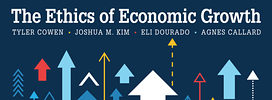My main outstanding disagreement is with Agnes Callard, who has doubled down on her claim that Stubborn Attachments is status quo-oriented. But there is simply no reason to think the status quo already maximizes the rate of sustainable economic growth, and the book is full of statements to the contrary. Consider the opening sentence (p.15): “When it comes to the future of our world, we have lost our way in a fundamental manner, and not just on a few details.” Or the beginning of the book’s concluding section (p.123): “My utopian political vision is a society that follows these principles. That means a society that lets individuality, happiness, and autonomy flower to their maximum extent. I don’t expect something so good to actually come about, but it is nonetheless a vision to live by…”
I am happy to admit that most of my specific suggestions for policy I have presented elsewhere, still the book itself is clear on its radicalism while maintaining a deliberate focus on abstract principles.
When it comes to valuing lives, different lives are either commensurable or they are not, again as I discuss in the book. If they are not, nobody is going to produce meaningful rankings of different social states of affairs, not even by summoning up the mysterious ghost of “philosophy.” If human lives are commensurable in some way, we are back to sustainable compounding growth as giving us a decisive answer. When it comes to real world policy, we must indeed choose, and it is simply punting to claim there is no basis for comparison or trade-offs. Economics and the logic of social choice return, whether we like it or not.

